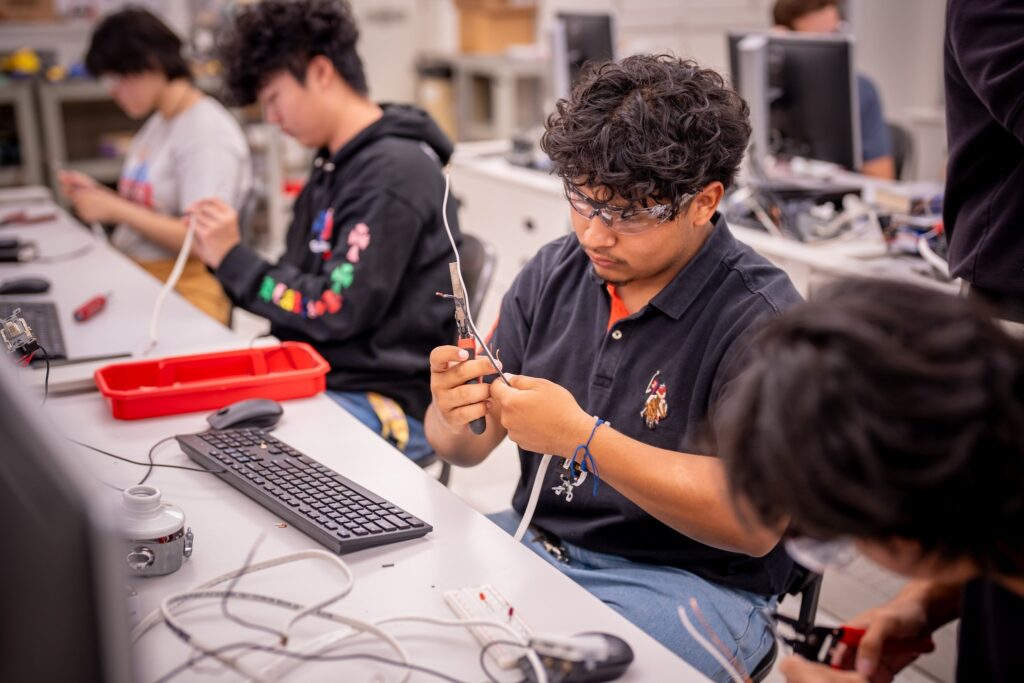
Students from across the San Gabriel Valley explored career tracks like industrial fabrication, welding, building construction, and electricity during Pasadena City College’s Summer Construction Career Program.
Credit: Pasadena City College
Disasters expose needs we often overlook — and clarify our responsibilities.
The recent wildfires in Los Angeles County — including the Eaton Fire that struck Pasadena and neighboring communities — damaged or destroyed more than 17,000 structures. The loss of lives and homes, and the disruption of normalcy and routines, was swift and severe.
California’s community colleges are a part of the communities they serve, giving them a deep understanding of both the challenges and the opportunities that emerge in moments of crisis. Pasadena City College has played this role over the last 100 years, stepping up again during the Eaton Fire and continuing to lead in the difficult work of recovery. The college is a hub for uniting partners, aligning resources and helping chart a path forward.
The California Community Colleges Chancellor’s Office responded quickly, providing emergency support to colleges in the Los Angeles region. Now, we are focused on long-term recovery — supporting workforce development through targeted programs, labor market research and collaborative initiatives.
This work is guided by the system’s Centers of Excellence, which operate across the state to provide up-to-date labor market data. These centers help colleges design programs that align with regional employment needs and recovery priorities. The Center of Excellence for the Los Angeles region has been particularly valuable in producing timely insights that support workforce planning during this critical period.
One of the most urgent challenges revealed through this data is a growing shortage of skilled workers in the building trades. Regional forecasts project a nearly 10% increase in construction-related jobs in the San Gabriel Valley alone — but the demand in building trade fields already exceeds supply. Skilled electricians, welders, plumbers and pipe fitters, building inspectors, and other professionals are needed not only to rebuild homes, schools, and infrastructure, but also to support California’s long-term economic growth.
In response, Pasadena City College is launching new workforce training programs in construction and related building trades. These programs are designed for a wide range of learners — high school graduates, adult learners and career changers — and are built to connect individuals with practical, in-demand skills that lead to stable, well-paying jobs.
Beyond technical training, the California Community Colleges Chancellor’s Office is also expanding pathways for students to engage in service and civic leadership. The College Corps program, launched by Gov. Gavin Newsom, provides college students with paid fellowships that combine community service with real-world experience. Participants gain hands-on skills while making meaningful contributions to their communities.
This fall, Pasadena City College will launch a College Corps cohort focused specifically on fire recovery and community resilience. Fellows will work with local government agencies, nonprofits, and businesses involved in recovery and rebuilding efforts. In return, they will gain valuable experience, build leadership skills, and receive financial support to continue their education. A Youth Service Corps, modeled on College Corps but designed for high school students, is also in development to expand access to early workforce and service learning.
Recently, Pasadena City College also introduced a Summer Construction Career Program in partnership with Harbor Freight Tools for Schools. This six-week “learn-and-earn” initiative offers high school students exposure to trades such as welding, electrical work, building inspection and industrial fabrication, while earning a paycheck. The program gives teens a direct pathway into high-demand fields and helps build a local talent pipeline.
To support this work at scale, Pasadena City College is developing a regional Career Technical Education center on its main campus. This new facility will provide hands-on training in the building trades for high school students, college students and working adults. It will serve as a regional hub for workforce development, allowing learners to acquire the skills they need to succeed without leaving their communities.
The wildfires underscored critical weaknesses in our housing, infrastructure and workforce systems. But they also reminded us of the vital role community colleges play in responding, not only in times of emergency, but in shaping long-term solutions.
The path forward is clear: invest in training, connect students to real jobs, and partner with local employers, government and community organizations to meet regional needs. That’s the work California’s community colleges are doing today — and it’s work we’re committed to carrying forward.
•••
Sonya Christian serves as the chancellor of the California Community Colleges. Jose A. Gomez is the president of Pasadena City College.
The opinions expressed in this commentary represent those of the author. EdSource welcomes commentaries representing diverse points of view. If you would like to submit a commentary, please review our guidelines and contact us.
2025-09-03 22:59:00
